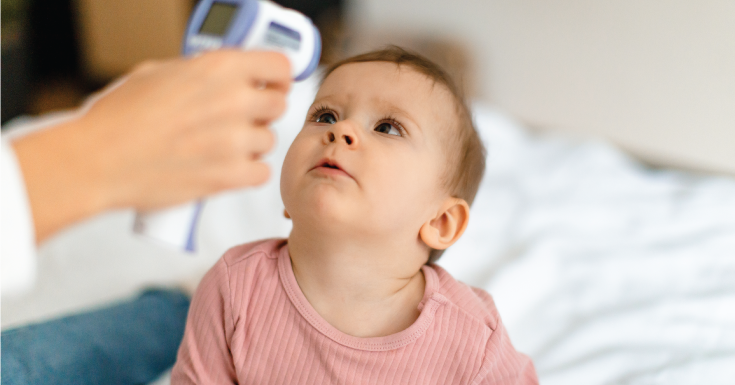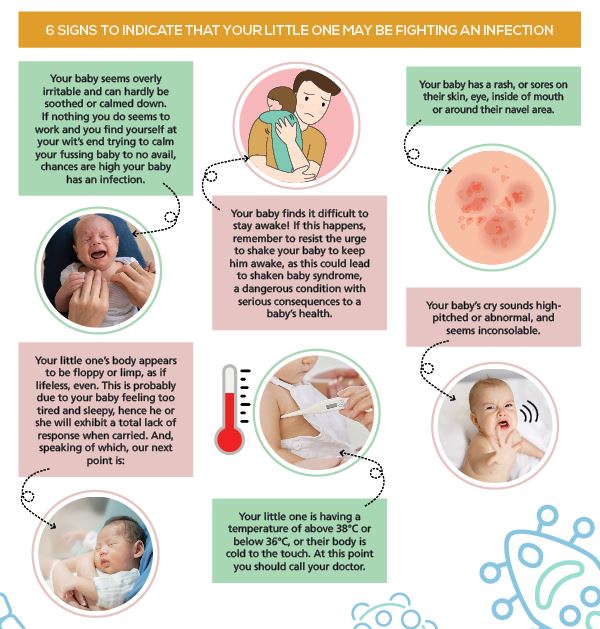When was the last time your baby got sick? It must have kept you up for most of the night, right? While illnesses and infections are inevitable, as parents, we instinctively feel that we ought to keep our precious little one safe from them. But have you ever wondered why? Well, it’s time for some facts-sharing and ultimately, learn how to keep your baby healthy, thriving, and free as possible from infections.
The first few weeks of your baby’s life is the most delicate and vulnerable period when it’s most important to keep the little one safe from infections. Babies, particularly newborns and babies up to 6 months of age have immature immune systems that are still in the process of development. This is the main contributing factor as to why they are susceptible to infections. Keep in mind too that infections that may seem mild in older children or adults can sometimes turn out to be quite serious for babies.
So, what can we do as parents to reduce the risk of infections in our babies? Well, here are a few key suggestions.
Firstly of course, is to determine if your baby is having an infection. It can be difficult to spot an infection in a baby, as the little one isn’t able to tell you how he or she is feeling. There will however, be signs you can look out for. But before we get to them, we would like to remind you to trust your motherly instincts when it comes to your baby’s health and wellbeing. If you suspect that something isn’t right with your baby’s health, or, if you feel worried or nervous over it, seek the help required from your family GP, or whichever health care provider you go to. If you are very worried, do not hesitate to visit the emergency department at the hospital.
Preventing the Spread of Germs When a Child is Ill
If a child is still very young, or under the age 2, they will need a caregiver’s help to prevent the spread of germs. So, it will be up to you to wash your child’s hands as often as needed, and disinfect all toys that are shared.
If your child becomes ill, it would be best to keep them out of daycare and away from other children until the highly contagious period has passed. If you are unsure about how long this should be, talk to your doctor.
If you or your partner smiles, remember to keep your little one away from second-hand smoke as smoke irritates the mucous membranes in their nose, sinuses, and lungs, making infections worse than it was.
When You Are Out and About with Your Little One
Whenever you are in a public area with your young child, firstly, be well-aware of all the risk factors pertaining to the exposure to germs. Germs from just one sick person is enough to make your child infected and ill. So, wherever you may be with your child, i. e a shopping mall, cinema, airport, supermarket, or even at the park, be aware that the risks are there, and use the following tips to help keep your child protected.
- Limit contact as much as possible with people who might be ill.
It’s not that hard to tell if someone isn’t feeling well, due to the sniffling, coughing, sneezing, and the general look of not being well. Avoid contact with them for now, and don’t hesitate to let them know, in case you failed to avoid them, to not get too close or touch your child.
Teach your little one not to keep touching their mouth, eyes, or nose until their hands are thoroughly washed with soap and water. - Help your child to properly wash their hands.
Always ensure that your child’s hands are thoroughly washed with soap and water after visiting the playground, after using the washroom, before eating anything, after touching an animal, etc. - Keep eating utensils, table surfaces, and general eating areas clean.
This will be up to you to see through, and when you fully comprehend the consequences of germs spreading from these places to your child, you will surely make it a point to always keep these areas clean. - Check on the hygiene practices that are followed in your child’s daycare.
These practices should include the sanitation of facilities and toys on a regular basis, clean, sanitary food preparation, proper washroom procedures, and procedures for dealing with sick children, i e when children suddenly become ill while in daycare. - Avoiding public areas at certain times.
During outbreaks of disease for example, it would be best to keep your young child away from large crowds. If being in a public place is inevitable, have your child wear a child-friendly face mask.



